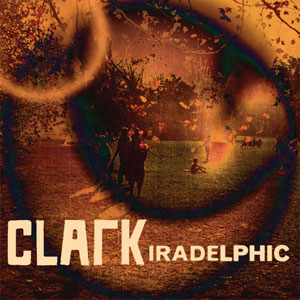Clark Iradelphic
Being a fan of an artist as versatile and restless as Chris Clark can be […]

Being a fan of an artist as versatile and restless as Chris Clark can be confounding. After discovering his music and getting to know the work that came before or after your entry point, you might find yourself unable to connect with all of Clark’s winding career. Let’s say your introduction was 2003’s Empty the Bones of You; the gritty IDM and meticulously crafted sound worlds therein could be easily compared to its predecessor, Clarence Park, or possibly even heard as a fitting precursor to the producer’s bafflingly ambitious masterwork, Body Riddle. But then there’s the underappreciated Turning Dragon and the questionable Totems Flare, two relatively tangential albums that successfully and unsuccessfully melded bits of dystopian rave music and mangled electronic pop into the hyperreal production style Clark built his name on. It can be hard to keep up with all of his stylistic shifts, and now, three years removed from his last album, the Berlin-based changeling opens a whole new chapter of his discography’s metamorphosis. So, you might be wondering, exactly how does Iradelphic fit in?
There are two understandable answers to this question. We’ll start with the assumption that Clark’s new LP is the logical progression of everything he’s released before it, which makes complete sense when listening to its first leak, “Com Touch.” Familiar synth arps, skeletal beat work, and the artist’s penchant for freeform melodic progressions are at the core of the tune, so much so that you could assume Clark plucked it from the Body Riddle tracklist. There are similar connections found in the rhythms and arrangement of “Tooth Moves,” and “Skyward Bruise/Descent” fits perfectly into the mold of the disorienting, beatless interludes that Clark fashioned back in 2001. Even throughout the wispy “Open,” you can catch hints of Riddle‘s deft live drumming, which is essentially a prelude to the heavy-handed “Secret,” a track that makes effective use of the percussive jangle and punishing smash prominently featured on Empty the Bones of You. All of this is to say that Clark hasn’t gone completely off the deep end—he’s at least vaguely tethered to his musical past.
However, it can also be said that Iradelphic largely falls well outside of the context of Clark’s previous work. It feels like an outlier mostly because of its rampant use of acoustic guitars, its predominantly jazzy motifs, and its occasional sultry—sometimes poignant—vocal contributions. The album’s first notes come from a fingerpicked guitar solo, which leads into an entire suite of guitar riffs featuring very few other sounds. And when Clark isn’t adding his own voice into the mix, the vocal melodies come from Martina Topley-Bird, who sounds something like a less-raspy Macy Gray. She’s basically a jazz singer (her extensive electronic-music pedigree notwithstanding), and like her producer, Topley-Bird is undeniably talented, but her bubbly skats and winking delivery isn’t exactly standard Warp Records fare. Equally unlikely is the piano interlude, “Black Stone.” Touching as it may be, it’s unusual in Clark’s repertoire, which just adds to his record’s overall challenging strangeness despite how beautiful it is.
“The Pining” somehow manages to converge this myriad of musical styles. Across the 10-minute triptych, Clark evenly applies his arsenal of electronic gear, live instruments, vocalists, and veteran production skills to a twisting composition that defies comparison. It brings to mind a quote that came with the album’s PR materials, in which the artist states, “To me, Iradelphic is looming, ambiguous, radiant, glowing, whole, invincible, complete.” The sentiment is understandable coming from the creator of these 12 tracks; having been there turning the wheels and calling the shots every step of the way, he undoubtedly knows how he arrived at creating what is essentially an electro-acoustic jazz-fusion record—albeit an uncommonly good one. But for those on the outside of that process, fans who are frantically trying to connect the missing links of Iradelphic‘s lineage with its beloved forefathers, more apt descriptors might be “unexpected,” “unfamiliar,” and “unfulfilling.”

